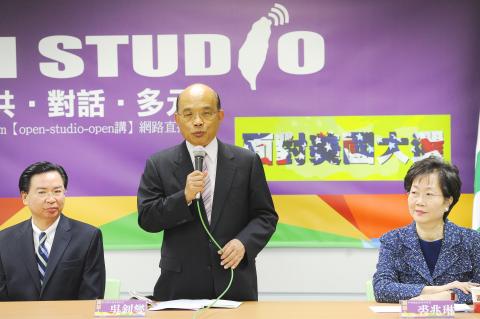The Democratic Progressive Party (DPP) is optimistic that its sour relations with the US is in the past and would be rebuilt by better channels of communication regardless of who wins today’s US presidential election, DPP officials said yesterday.
Relations with the US have been one of the priority issues since he took the party’s helm and it would continue to be so, DPP Chairman Su Tseng-chang (蘇貞昌) told a forum, which previewed the US presidential election, at DPP headquarters.
Relations between the DPP and the US took a downturn during the latter part of Chen Shui-bian’s (陳水扁) presidency and hit bottom after the US beef controversy and a US official’s criticism of DPP presidential candidate Tsai Ing-wen (蔡英文), said Joseph Wu (吳釗燮), executive director of the DPP’s Policy Research Committee.

Photo: George Tsorng, Taipei Times
However, the DPP is determined to put the past behind, with the party sending legislators and party officials to the US Democratic Party and Republican Party’s conventions in August and September, Wu said.
Wu and Liu Shih-chung (劉世忠), director of the DPP’s Department of International Affairs, also visited officials of the US government and the Republican Party.
The response to the trips were phenomenal, as US officials showed their good will and intention to ensure smooth communication with the DPP, said Wu, who was formerly Taiwan’s representative to the US.
“People I talked to in the US expressed wishes for Taiwan to maintain closer relations with Japan and concern toward President Ma Ying-jeou’s (馬英九) pro-China handling of the dispute over the Diaoyutais (釣魚台),” Wu said.
With the establishment of an office in Washington in the plan, the DPP is confident that it could work with the US government regardless of who — US President Barack Obama or his Republican challenger, Mitt Romney — wins the presidential election, Liu said.
The party expressed its wish to avoid the “surprise and misunderstanding” during the January presidential campaign and reassure Washington that Su’s mentality and approach on China affairs would be “flexible and pragmatic,” Liu said.
With the US election going down to the wire with no clear-cut favorite, the only sure thing for Taiwan is that the US team on Asia-Pacific affairs would be undergoing personnel changes, said Joanne Chang (裘兆琳), a research fellow at Academia Sinica’s Institute of European and American Studies.
In a review of Obama’s Taiwan policy, Chang said the US president had placed US-Taiwan relations under the framework of US-Sino relations during his first two years in office, between 2008 and 2010.
However, Obama’s good will was not well-accepted by the Chinese, which was why he approved the arms sale to Taiwan in 2010 and later made changes on his Taiwan policy, evidenced by closer bilateral engagement at APEC, inclusion of Taiwan in the visa-waiver program and high-level talks in the Pentagon, Chang said.
Creating jobs and promoting exports would be high on the agenda of whoever wins the US election and that could pose concerns for Taiwan because the US is not a Santa Claus who only helps Taiwan without asking favors in return, she said.
“The US could look for exporting more products to Taiwan. And Taiwan has to be ready for the impact, in particular after the US beef controversy last year,” Chang said.

US climber Alex Honnold is to attempt to scale Taipei 101 without a rope and harness in a live Netflix special on Jan. 24, the streaming platform announced on Wednesday. Accounting for the time difference, the two-hour broadcast of Honnold’s climb, called Skyscraper Live, is to air on Jan. 23 in the US, Netflix said in a statement. Honnold, 40, was the first person ever to free solo climb the 900m El Capitan rock formation in Yosemite National Park — a feat that was recorded and later made into the 2018 documentary film Free Solo. Netflix previewed Skyscraper Live in October, after videos

Starting on Jan. 1, YouBike riders must have insurance to use the service, and a six-month trial of NT$5 coupons under certain conditions would be implemented to balance bike shortages, a joint statement from transportation departments across Taipei, New Taipei City and Taoyuan announced yesterday. The rental bike system operator said that coupons would be offered to riders to rent bikes from full stations, for riders who take out an electric-assisted bike from a full station, and for riders who return a bike to an empty station. All riders with YouBike accounts are automatically eligible for the program, and each membership account

A classified Pentagon-produced, multiyear assessment — the Overmatch brief — highlighted unreported Chinese capabilities to destroy US military assets and identified US supply chain choke points, painting a disturbing picture of waning US military might, a New York Times editorial published on Monday said. US Secretary of Defense Pete Hegseth’s comments in November last year that “we lose every time” in Pentagon-conducted war games pitting the US against China further highlighted the uncertainty about the US’ capability to intervene in the event of a Chinese invasion of Taiwan. “It shows the Pentagon’s overreliance on expensive, vulnerable weapons as adversaries field cheap, technologically

NUMBERs IMBALANCE: More than 4 million Taiwanese have visited China this year, while only about half a million Chinese have visited here Beijing has yet to respond to Taiwan’s requests for negotiation over matters related to the recovery of cross-strait tourism, the Tourism Administration said yesterday. Taiwan’s tourism authority issued the statement after Chinese-language daily the China Times reported yesterday that the government’s policy of banning group tours to China does not stop Taiwanese from visiting the country. As of October, more than 4.2 million had traveled to China this year, exceeding last year. Beijing estimated the number of Taiwanese tourists in China could reach 4.5 million this year. By contrast, only 500,000 Chinese tourists are expected in Taiwan, the report said. The report